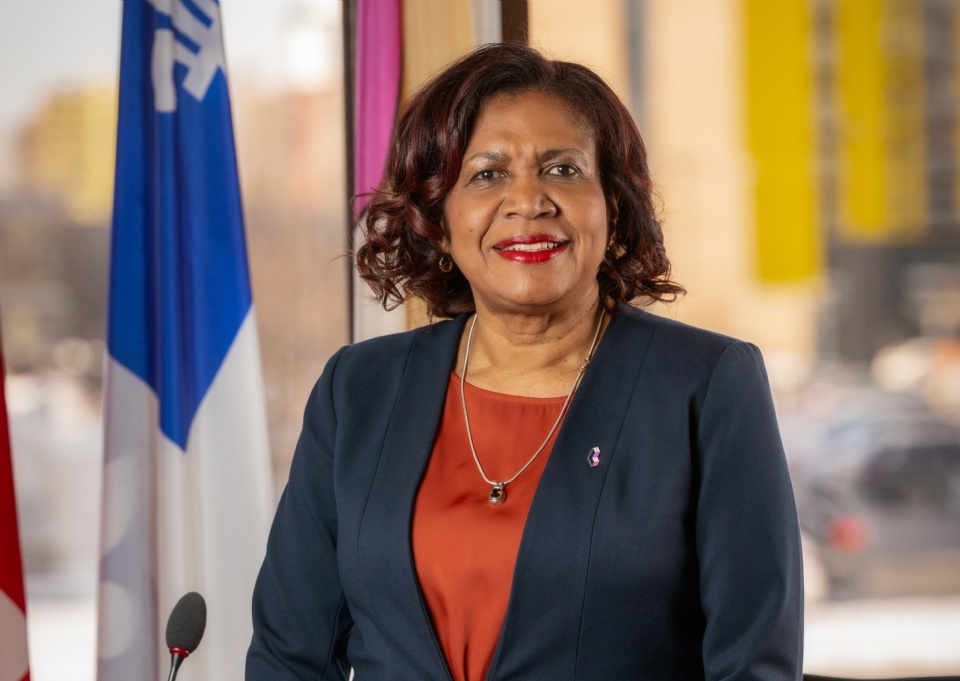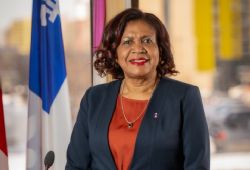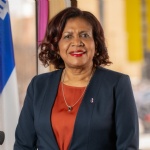When I was given the chance to write in
this edition of Laval Families Magazine, with content that is distributed
across our city and read by so many citizens and families, I was driven to put
forward my role as City Councillor Responsible for Immigration
There is so much diversity in the city,
second in line when it comes to having the most cultural minorities in Quebec,
and I find it important to highlight how that plays into the development of the
city.
How does Laval embrace immigration?
In recent years, great ranges of policies
were adopted to facilitate the integration of our communities. It was important
for us that Laval provide services to make all members of the city strive
economically, but also on all levels of public life. Immigration population
grew vastly in the past few years. One out of three Laval citizens is an
immigrant and between 2001 and 2016, the immigrant population more than
doubled.This means that immigrants are choosing Laval as their home. It makes
it that much more important to include this population in the flourishing of
our city.
Here are some examples of such policies. We
had set in place a system of help and integration for the more than 1300 Syrian
refugees that arrived in 2015 and 2016. Two committees established by the city
provided services to ensure transition into their new livees. Funds and
resources were deployed to assist Moisson Laval and the Laval Volunteer Center
to support the coordination of donations and assistance.
In 2017, the city of Laval and the Ministère
de l’Immigration, de la Diversité et de l’Inclusion signed an agreement of one
million dollars to fund projects for the inclusion and participation of
immigrants in their communities. The idea was to encourage those populations,
who are new to our political and social systems, to take part in the
development of the city as a whole.As of today, 17 projects were put in place
thanks to this agreement. It included cultural activities like music and
dancing, but also guided visits to services institution and the creation of
women’s sharing groups for immigrant women.
In 2020, we had announced an Immigration
Forum, which I was so pleased to be able to advocate and put forward while
carrying my duties. As we all know, this year has seen numerous unexpected
changes in our plans and projects. We are still committed to seeing this forum
take place in Laval, but the format is being reviewed to adapt to the current
situation.
Striving to be better
Of course, like any organization, we can
only strive to do and be better. This year particularly has brought forward the
necessity to ask ourselves what can be done to ensure our policies and actions
truly reflect the diversity of our society.
This past summer,
we announced our new consultation process called Nouveau regard sur le Service
de police de Laval (New Perspective on the Laval Police Department) which aims
to offer a service of proximity to all Laval citizens, regardless of ethnic
background. To keep our practices evolving, we have targeted the following key
elements. Globally, the thought process included three main ideas, growing our
knowledge and understanding of the realities of ethnic minorities; encouraging
youth coming from an immigrant background to work in public security to make
the field more representative; putting in place strong policies in consultation
with our Youth Consultative Committee and our Intercultural Consultative
Committee as well as with citizens and non-profit organizations.
During the Fall of 2020, numerous forms of
public consultations took place, and are still taking place to collect
citizens’ opinions, testimonies and visions on our services and how they affect
immigrant populations. This will serve for upcoming changes in our practices.
Visit www.repensonslaval.ca/dialogue-police to have more information on how to participate in this important
discussion.
My role as the
City Councillor Responsible for Immigration gave me the opportunity to bring
forward the contribution of immigrant populations. It is also helping me learn
how to walk towards a society increasingly inclusive, diverse, and equal. This
is not possible without the inclusion of all voices in the process of
policy-making. It is together that we will build a society that truly represents
all of our collective aspirations enhanced by all backgrounds.

 In The Latest Issue:Latest Issue:
In The Latest Issue:Latest Issue:
- Celebrating Community an...
- Celebrating the Unsung H...
- Understanding Newborn St...
Articles
Calendar
Virtual- ANNUAL TEACHER APPRECIATION CONTEST
- APPUI LAVAL
- ARTS & CULTURE
- CAMPS
- CAR GUIDE
- CCIL
- CENTENNIAL ACADEMY
- CHARITY FUNDRAISING
- CITYTV
- COSMODÔME
- COMMUNITY CONNECTIONS
- COVER STORY
- DINA DIMITRATOS
- ÉCOLE SUPÉRIEURE DE BALLET DU QUÉBEC
- EDITORIALS
- ÉDUCALOI
- EDUCATION
- EMPLOYMENT & ENTREPRENEURSHIP
- FÊTE DE LA FAMILLE
- FÊTE DU QUARTIER SAINT-BRUNO
- FAMILIES
- FESTIVAL LAVAL LAUGHS
- FÊTE DE QUARTIER VAL-DES-BRISES
- FINANCES
- GLI CUMBARE
- GROUPE RENO-EXPERT
- HEALTH & WELL-BEING
- 30 MINUTE HIT
- ANXIETY
- CHILDREN`S HEALTH & WELLNESS
- CLOSE AID
- DENTAL WELLNESS
- EXTREME EVOLUTION SPORTS CENTRE
- FONDATION CITÉ DE LA SANTÉ
- GENERAL
- HEARING HEALTH
- MESSAGES FROM THE HEALTH AGENCY OF CANADA
- MENTAL HEALTH
- SEXUALITY
- SOCIAL INTEGRATION
- SPECIAL NEEDS
- TEENS
- THE NUTRITION CORNER
- THE NUTRITION CORNER - RECIPES
- VACATION DESTINATION
- WOMEN'S FITNESS
- WOMEN'S HEALTH
- HILTON MONTREAL/LAVAL
- HOME & GARDEN
- INTERNATIONAL WOMEN'S DAY
- JAGUAR LAVAL
- LAVAL À VÉLO
- LAVAL FAMILIES TV SHOW
- LAVAL FAMILIES MAGAZINE CARES
- LAVAL URBAN IN NATURE
- LE PARCOURS DES HÉROS
- LES PETITS GOURMETS DANS MA COUR
- LEON'S FURNITURE
- LEONARDO DA VINCI CENTRE
- LFM PREMIERES
- LIFE BALANCE
- M.P. PROFILE
- MISS EDGAR'S AND MISS CRAMP'S SCHOOL
- MISSING CHILDREN'S NETWORK
- NETFOLIE
- NORTH STAR ACADEMY LAVAL
- OUTFRONT MEDIA
- PASSION SOCCER
- PARC DE LA RIVIÈRE-DES-MILLE-ÎLES
- PÂTISSERIE ST-MARTIN
- PIZZERIA LÌOLÀ
- PLACE BELL
- PORTRAITS OF YOUR MNA'S
- ROCKET DE LAVAL
- SACRED HEART SCHOOL
- SCOTIA BANK
- SHERATON LAVAL HOTEL
- SOCIÉTÉ ALZHEIMER LAVAL
- STATION 55
- STL
- SUBARU DE LAVAL
- TECHNOLOGY
- TEDXLAVAL
- TODAY`S LAURENTIANS AND LANAUDIÈRE
- TODAY`S LAVAL
- WARNER MUSIC
- THIS ISSUE
- MOST RECENT
Magazine
What’s the Future for Laval as a Multicultural City?
Articles ~e 105,7 Rythme FM 4 chemins Annual Teacher Appreciation Contest Appui Laval Arts & Culture Ballet Eddy Toussaint Camps THIS ISSUE MORE...
CONTESTS Enter our contests
CONTESTS Enter our contests
CALENDAR
Events & Activities
COMMUNITY Posts Events
PUBLICATIONS Our Magazine Family Resource Directory
LFM BUSINESS NETWORK Learn more
COUPONS Click to save!
COMMUNITY Posts Events
PUBLICATIONS Our Magazine Family Resource Directory
LFM BUSINESS NETWORK Learn more
COUPONS Click to save!
SUBSCRIPTIONS
Subscribe to the magazine
Un-Subscribe
E-NEWSLETTER Subscribe to our E-newsletter Un-Subscribe
WRITE FOR US Guidelines & Submissions
POLLS Vote today!
E-NEWSLETTER Subscribe to our E-newsletter Un-Subscribe
WRITE FOR US Guidelines & Submissions
POLLS Vote today!
ADVERTISERS
How to & Media guide
Pay your LFM invoice
SUGGESTIONS Reader's Survey Suggest a Listing
LFM About Us Our Mission Giving Back Contact Us
SUGGESTIONS Reader's Survey Suggest a Listing
LFM About Us Our Mission Giving Back Contact Us
 PICK-UP LOCATIONS
Get a copy of LFM!
PICK-UP LOCATIONS
Get a copy of LFM!
TERMS & CONDITIONS Privacy | Terms
ISSN (ONLINE) 2291-1677
ISSN (PRINT) 2291-1677
Website by ZENxDESIGN



 BY:
BY: 


Tweet
Share